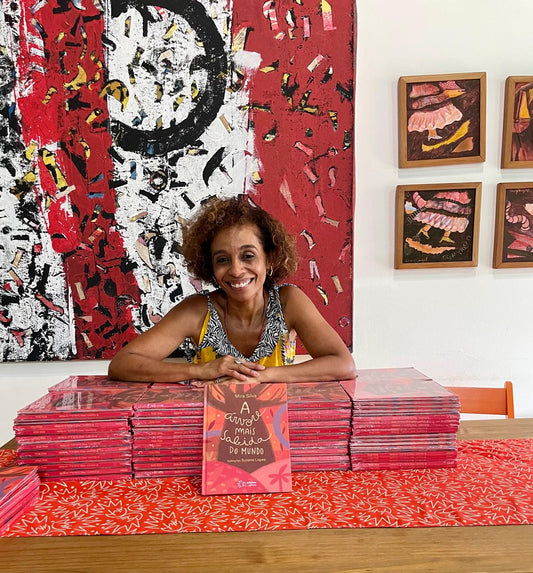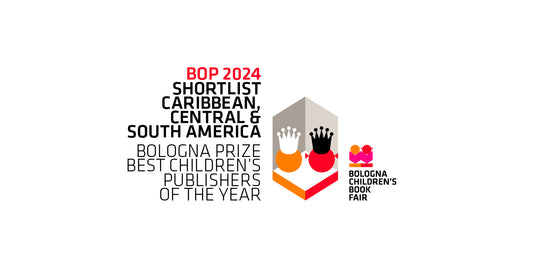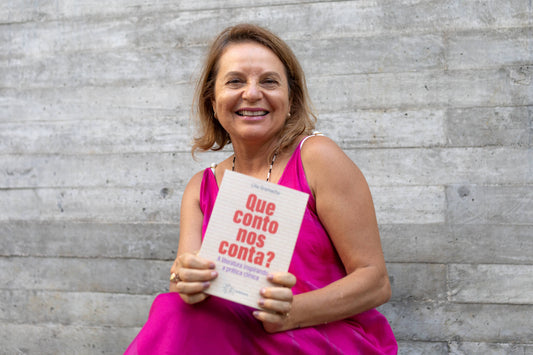Born in Santiago, the writer has already been to Salvador once, on the occasion of the launch of her first title published in Brazil, 'A Mulher da Guarda' (Solisluna/Selo Emília).
In this interview, she talks about the new projects, the relationship with Solisluna and Bahia.
You can also follow the activities and plan to participate.
- How did you find out about Solisluna and how did your partnership with the publisher begin?
I discovered Solisluna thanks to (magazine) Emília, specifically Dolores Prades (founding partner of Instituto Emília), who told me about the possibility of publishing in Brazil with Valéria Pergentino (founding partner and editor of Solisluna). The two women, I must say, are great defenders of literature in general and children's literature in particular, and it is not trivial to say that, because editors and publishers often allow themselves to be carried away by fads or the needs of the market, which is why I appreciate people like Dolores and Valéria, who assume a certain militancy for literature, for the power that literature has - not only to mobilize people, but also to transform the world.
- What came first: the relationship with Solisluna or the relationship with Bahia? How many times have you been here?
I start by saying that my relationship with Bahia today is one of enormous respect and admiration for its culture in the broadest terms, I like everything: its music, dance, architecture, literature, poetry, ways of doing and saying it. And the truth is that this was thanks to my friendship with Valéria, editor of Solisluna. During the pandemic, in those dark, same-old days, we started meeting weekly as a way to escape the boredom. So, she taught me Portuguese and I taught her Spanish. Little by little, these weekly meetings also became an exchange of readings, landscapes, music and this generated in me enthusiasm for their culture. Bahian women, I believe, are not only beautiful, but very talented and I have enjoyed getting closer of his literature and thought. The form they took in defending the intangible heritage of which they are guardians.
- In August you have some activities in Salvador, such as the writing course to be held with Solisluna, the launch of two new books by the publisher and participation in Flipelô. What are your expectations for these moments?
Well, as in any meeting with readers, I expect to be able to respond to their questions and concerns, to serve as a bridge between their doubts and mine, to make that special exchange that workshops and conversations produce, when thought is launched in a collective to be questioned, redefined and, finally, produce certain common meanings. It seems to me that there is no better experience (after reading, certainly, and after writing, sometimes) than this open meeting with readers. These are moments to stop, fuel the conversation and allow reflections that do not always happen in everyday life.
- What can participants expect from the ' Travel Diary ' writing course?
The results of writing workshops depend, to a large extent, on the willingness of each participant to stop and look. Observation is the mother of writing, and what courses of this type do is offer tools to make this happen. In the case of 'Travel Diary', it is a proposal to look at our daily lives as something extraordinary, different, to be able to perceive the unusual in the usual. Any life can be narrated. In other words: we are all a novel to be written and, to do so, we just have to make ourselves available. Just like in the film Ratatouille (2007), I would say that anyone can write, that it is a craft that requires hours of practice and that is what the workshop provides them: a space to exercise themselves.
- At Flipelô, you will be at the table 'Writing Mothers - Maternity and Resistance', which is also the name of your next book. Please tell us a little about this work.
I would like to start by telling you about an infidelity: 'Writing as mothers' began as a commission from Valéria. She wanted me to write a column for the Solisluna Newsletter and I said I would write about mothers, so I started reading. First, I reread all the writers, poets and essayists that I have in my library, paying attention to how they wrote “the” mothers and one thing led to another and I continued reading other authors that were not in my library. After a month, Valéria asked me about the article, I said I was a little late and I continued reading, unstoppably, and suddenly I realized that I had read at least 60 books about motherhood stories, real motherhood, not fake, you know? And I was surprised to hear these women talking about their own experiences and I started writing. When Valéria asked me again how the article was going, I had to admit that I wasn't going to write it. and yes, something longer, an essay, a book about mothers, about daughters, about sons, about mothers' relationships with themselves and with their own mothers and grandmothers, that is, with the whole chain of motherhood that occurs before of a woman becoming a mother. And that's how I understood the importance of this literature as a form of emancipation, to leave the institutional and patriarchal mother and enter directly into real mothers, into singular mothers. This is the starting point. The rest, you'll have to go to the lecture at Flipelô (laughs).
- Through Solisluna, together with Selo Emília, you released 'A Mulher da Guarda' and 'Patos e Lobos-marinhos'. The next ones are 'The Memory of the Woods' and 'Outside the Ghosts'. Please tell us a little about these books.
In general terms, both The Memory of the Woods (with illustrations by Colombian Elizabeth Builes) and Out There, the Ghosts (illustrated by Mexican Amanda Mijangos) deal with childhood fears. The first deals with uprooting, and the second, the fear of the dark, of the mother's absence, that almost atavistic fear that we have all had at some point: the night, the lack of love. So, I would say that these are books to talk about, to leave on the table and allow children to dialogue with their own forests and ghosts, but, above all, they are books that function as questions. I like children to formulate their concerns because they tend to be very perceptive with their doubts and, above all, very deep, capable of elaborating their emotions very well.
- What is the profile of your readership in Brazil? Do you identify any differences between them and Chilean readers or readers from other countries?
For me, readers are a category that groups together the most disparate people, like clubs or dance groups. We get there without knowing exactly what we are going to find, but it turns out that you recognize your group, because I am, first and foremost, a reader and, as such, I like nothing better than being with other readers and talking about readings. As you can see, an immense and open community that dialogues, suffers, loves, despairs, in short, restless human beings, who tend to inhabit spaces of questioning without feeling too uncomfortable.
- Why did you decide to be a writer?
Phew, to answer that question, I would have to start with Adam. Or perhaps it would be enough to say “because I read”. Since I was a child, books have accompanied me as I grew up, they have been great traveling companions and, in a very particular sense, they are part of my life. I can't imagine myself without them. So writing has been another way to keep reading.
PROGRAM YOURSELF!
Children's book launches
'Memory of the Woods' and 'Outside, the Ghosts'
August 6th (Sunday)
16 hours
LDM Bookstore at Shopping Bela Vista - Alameda Euvaldo Luz, 92, Horto Bela Vista, Salvador
Creative Writing Workshop 'Travel Diary'
August 7th (Monday) and August 8th (Tuesday)
6:30 pm to 9:30 pm
Casa Rosa - Praça Colombo, 106, Rio Vermelho, Salvador
Limited places - Registration at the link. https://materiais.solisluna.com.br/oficina-diario-de-viagem
Flipelo
Mini course for young people 'Notebook'
August 12th (Saturday)
10 am to 1 pm
Fundação Casa de Jorge Amado - Sala Myriam Fraga - Largo do Pelourinho, 15, Salvador
Flipelo
Writing to Mothers Table - Motherhood and Resistance
August 13th (Sunday)
11am
Eugênio Teixeira Leal Museum - Rua do Açadoguinho, 1, Pelourinho, Salvador






